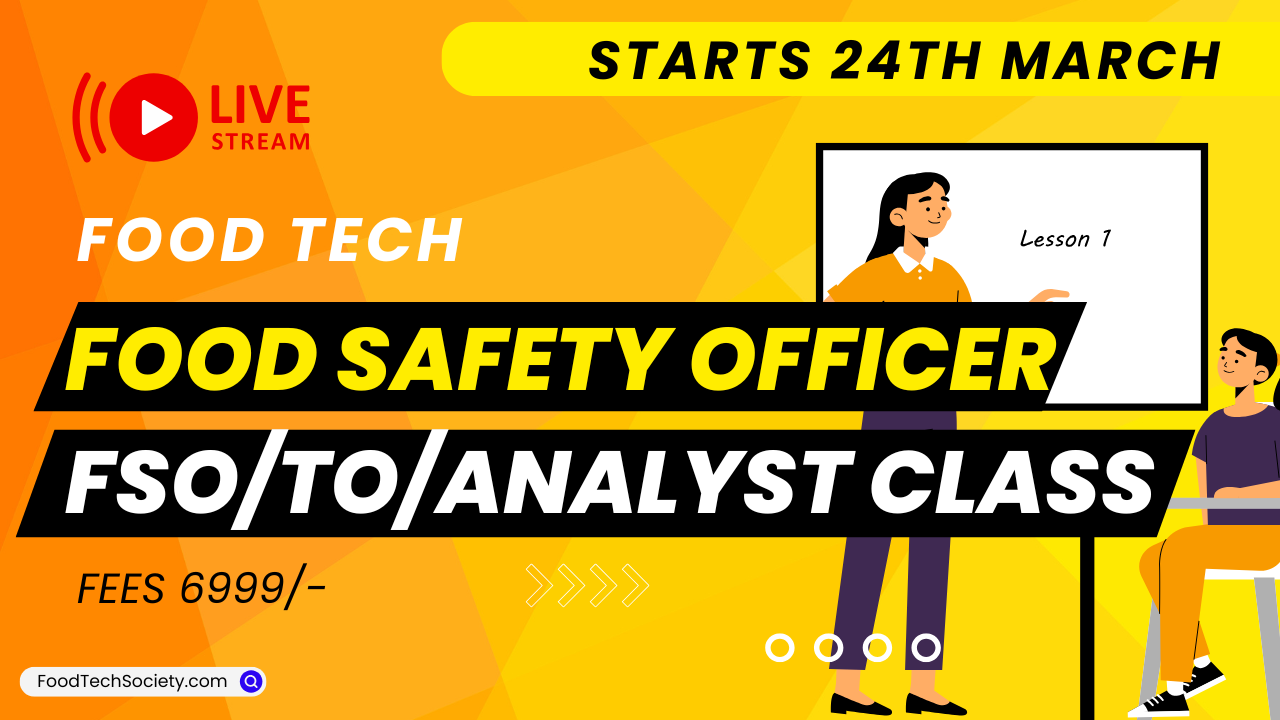Food Safety Officer, FSSAI Technical Officer and FSSAI Food analyst Examination – Online Classes

About Course
- Starts – 24th March 2025
- Duration – 3 to 4 Months
- Time – 07:00pm to 09:00pm
- (NOTE – 30% DISCOUNT AVAILABLE IF YOU DO NOT WANT 6 CERTIFICATES)
- Day – 5 day in a week (Mon, Tue, Wed, Thu, Fri)
NOTE – Mention your WhatsApp number while registering so that you can be added in the classroom
NOTE – Students can directly pay the fees on our official UPI number +91 7054384357 if they face any tech issues.
Our Tutors & Guest Lecture – Our all tutors are experienced working professionals from
- FSSAI – Technical Officers
- FSSAI – Central Food safety officers
- FSSAI – Food analysts
- From APEDA, MPERDA
- From Export council of India
- From Bureau of Indian standards
- From CSIR, Scientists
- State Food Departments
- Industry & Regulatory experts
- Professors & Scientists etc & Many More
MORE…
Food Tech Society offers FSSAI online course through the medium of best teachers that you can find in the industry as well as in research. We ensure that you not only beat the exam but clear it by making a score. Our past successes give us that encouragement. The online course for FSSAI Technical Officer, CFSO and FSSAI Food Analyst Examination is curated by a team of experts only after a detailed analysis of previous year question papers, the latest exam pattern and the syllabus covering all aspects.
Benefits of taking FSSAI Technical, Central Food Safety Officer and FSSAI Food Analyst Examination Online Course Coaching Online –
Comprehensive Preparation:
Online course provides a structured and comprehensive curriculum that covers all the essential topics and concepts required for the FSSAI Technical, Central Food Safety Officer & FSSAI Food Analyst Examination. The course materials are designed by subject matter experts who have a deep understanding of the exam pattern and syllabus.
Flexibility and Convenience:
One of the major advantages of online course is its flexibility. You can access the course materials and lectures at any time and from anywhere, allowing you to study at your own pace. This flexibility is particularly beneficial for working professionals or individuals with other commitments.
Expert Guidance:
Online course offers access to experienced faculty and subject matter experts who can provide guidance and support throughout your preparation journey. They can clarify doubts, provide personalized feedback, and offer valuable insights into exam strategies and techniques.
How our Online Course different from other –
Interactive Learning:
Online courses platforms often incorporate interactive learning tools such as live classes, discussion forums, and doubt-solving sessions. These features promote active participation, engagement, and better understanding of the concepts. Additionally, you may have the opportunity to interact with fellow aspirants, fostering a sense of community and peer learning.
Mock Tests and Practice Material:
Online course usually provides a wide range of mock tests and practice materials that simulate the actual exam environment. Regular practice through these resources helps you assess your progress, identify your strengths and weaknesses, and fine-tune your exam preparation accordingly.
Time and Cost Savings:
Online course eliminates the need for commuting to physical coaching centers, saving you time and money. You can study from the comfort of your own home and avoid additional expenses such as transportation or accommodation.
Updated Content:
Reputed online coaching platforms ensure that their course content is regularly updated to align with the latest exam patterns and syllabus changes. This ensures that you receive the most relevant and up-to-date information for your exam preparation.
Student Ratings & Reviews
